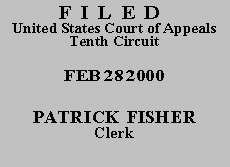

| DAVID MATTHEWS,
Plaintiff-Appellant, v. KENNECOTT COPPER CORPORATION, Defendant-Appellee. |
|
Plaintiff-appellant David Matthews appeals from summary judgment entered in favor of defendant-appellee Kennecott Utah Copper Corporation on his discrimination claim brought pursuant to Title I of the Americans with Disabilities Act, 42 U.S.C. §§ 12101-17 (ADA) and on his state law claims for breach of contract, breach of the covenant of good faith and fair dealing, intentional infliction of emotional distress, and negligent supervision. Our jurisdiction arises under 28 U.S.C. § 1291, and we affirm.
Appellant's claims arose from his belief that he was transferred, demoted, denied jobs, and terminated because he suffered from a learning disability. During the discovery period, appellant stipulated to dismissal with prejudice of his claim for retaliation under the ADA and of his state law claims for defamation and wrongful discharge. See Appellee's Supp. App. at 27-28. Thereafter, appellee moved for summary judgment on the remaining claims. After a hearing on the motion, appellant stipulated to dismissal of his state law claims for breach of contract, breach of the covenant of good faith and fair dealing, intentional infliction of emotional distress, and negligent supervision. See id. at 174. Despite the stipulation, the district court also analyzed those claims on their merits in the memorandum opinion and order and granted summary judgment on them.
The district court granted summary judgment on appellant's discrimination claim because he failed to timely file his claims with the Equal Employment Opportunity Commission (EEOC) as required by § 12117(a) of the ADA and 42 U.S.C. § 2000e-5. See id. at 183-84. Construing his arguments on appeal broadly, appellant seems to argue that his failure to properly file his EEOC claims should be equitably tolled because: (1) his learning disability precluded him from knowing the proper way to proceed; and (2) he received "wrong advice" from counsel. A review of the record shows that appellant never raised these two arguments to the district court and the court therefore did not consider them when granting summary judgment. We will not consider these arguments now. See Smith v. Rogers Galvanizing Co., 128 F.3d 1380, 1386 (10th Cir. 1997) (stating that this court considers matters not raised or argued in the trial court only in the "most unusual circumstances," such as in questions regarding jurisdiction or sovereign immunity or where public interest is implicated or manifest injustice would result) (quotation omitted).
In his third issue on appeal, appellant argues that his claim for wrongful discharge should go to trial because appellee wrongfully terminated him for absences occurring while he was on leave under the Family and Medical Leave Act.(1) Because appellant had previously stipulated to dismissal of his wrongful discharge claim, and the district court had earlier dismissed that claim with prejudice, the district court did not address the wrongful discharge claim other than noting that it had previously been dismissed. See Appellee's Supp. App. at 175. Having stipulated in district court to the dismissal of his wrongful discharge claim, appellant is now precluded from challenging the dismissal of that claim. See Smith, 128 F.3d at 1386.
The judgment of the United States District Court for the District of Utah is AFFIRMED.
Entered for the Court
Circuit Judge
*. This order and judgment is not binding precedent, except under the doctrines of law of the case, res judicata, and collateral estoppel. The court generally disfavors the citation of orders and judgments; nevertheless, an order and judgment may be cited under the terms and conditions of 10th Cir. R. 36.3.
1. We note that plaintiff's claim for wrongful discharge was based on his assertion that he was terminated "solely as a consequence of reporting the discrimination to which he has been subjected" and did not allege violation of the Family Medical Leave Act. Appellee's Supp. App. at 9.